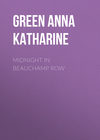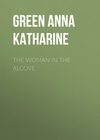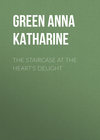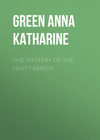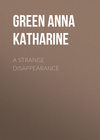Buch lesen: «Hand and Ring», Seite 2
II.
AN APPEAL TO HEAVEN
Her step was royal – queen-like. – Longfellow.
IT was now half-past one. An hour and a half had elapsed since the widow had been laid upon her bed, and to all appearance no change had taken place in her condition. Within the room where she lay were collected the doctor and one or two neighbors of the female sex, who watched every breath she drew, and stood ready to notice the slightest change in the stony face that, dim with the shadow of death, stared upon them from the unruffled pillows. In the sitting-room Lawyer Orcutt conversed in a subdued voice with Mr. Ferris, in regard to such incidents of the widow's life as had come under his notice in the years of their daily companionship, while the crowd about the gate vented their interest in loud exclamations of wrath against the tramp who had been found, and the unknown humpback who had not. Our story leads us into the crowd in front.
"I don't think she'll ever come to," said one, who from his dusty coat might have been a miller. "Blows like that haven't much let-up about them."
"Doctor says she will die before morning," put in a pert young miss, anxious to have her voice heard.
"Then it will be murder and no mistake, and that brute of a tramp will hang as high as Haman."
"Don't condemn a man before you've had a chance to hear what he has to say for himself," cried another in a strictly judicial tone. "How do you know as he came to this house at all?"
"Miss Perkins says he did, and Mrs. Phillips too; they saw him go into the gate."
"And what else did they see? I warrant he wasn't the only beggar that was roaming round this morning."
"No; there was a tin peddler in the street, for I saw him my own self, and Mrs. Clemmens standing in the door flourishing her broom at him. She was mighty short with such folks. Wouldn't wonder if some of the unholy wretches killed her out of spite. They're a wicked lot, the whole of them."
"Widow Clemmens had a quick temper, but she had a mighty good heart notwithstanding. See how kind she was to them Hubbells."
"And how hard she was to that Pratt girl."
"Well, I know, but – " And so on and so on, in a hum and a buzz about the head of Mr. Byrd, who, engaged in thought seemingly far removed from the subject in hand, stood leaning against the fence, careless and insouciant. Suddenly there was a lull, then a short cry, then a woman's voice rose clear, ringing, and commanding, and Mr. Byrd caught the following words:
"What is this I hear? Mrs. Clemmens dead? Struck down by some wandering tramp? Murdered and in her own house?"
In an instant, every eye, including Mr. Byrd's, was fixed upon the speaker. The crowd parted, and the young girl, who had spoken from the street, came into the gate. She was a remarkable-looking person. Tall, large, and majestic in every proportion of an unusually noble figure, she was of a make and possessed a bearing to attract attention had she borne a less striking and beautiful countenance. As it was, the glance lingered but a moment on the grand curves and lithe loveliness of that matchless figure, and passed at once to the face. Once there, it did not soon wander; for though its beauty was incontestable, the something that lay behind that beauty was more incontestable still, and held you, in spite of yourself, long after you had become acquainted with the broad white brow, the clear, deep, changing gray eye, the straight but characteristic nose, and the ruddy, nervous lip. You felt that, young and beautiful as she was, and charming as she might be, she was also one of nature's unsolvable mysteries – a woman whom you might study, obey, adore, but whom you could never hope to understand; a Sphinx without an Œdipus. She was dressed in dark green, and held her gloves in her hand. Her appearance was that of one who had been profoundly startled.
"Why don't some one answer me?" she asked, after an instant's pause, seemingly unconscious that, alike to those who knew her and to those who did not, her air and manner were such as to naturally impose silence. "Must I go into the house in order to find out if this good woman is dead or not?"
"Shure she isn't dead yet," spoke up a brawny butcher-boy, bolder than the rest. "But she's sore hurt, miss, and the doctors say as how there is no hope."
A change impossible to understand passed over the girl's face. Had she been less vigorous of body, she would have staggered. As it was, she stood still, rigidly still, and seemed to summon up her faculties, till the very clinch of her fingers spoke of the strong control she was putting upon herself.
"It is dreadful, dreadful!" she murmured, this time in a whisper, and as if to some rising protest in her own soul. "No good can come of it, none." Then, as if awakening to the scene about her, shook her head and cried to those nearest: "It was a tramp who did it, I suppose; at least, I am told so."
"A tramp has been took up, miss, on suspicion, as they call it."
"If a tramp has been taken up on suspicion, then he was the one who assailed her, of course." And pushing on through the crowd that fell back still more awe-struck than before, she went into the house.
The murmur that followed her was subdued but universal. It made no impression on Mr. Byrd. He had leaned forward to watch the girl's retreating form, but, finding his view intercepted by the wrinkled profile of an old crone who had leaned forward too, had drawn impatiently back. Something in that crone's aged face made him address her.
"You know the lady?" he inquired.
"Yes," was the cautious reply, given, however, with a leer he found not altogether pleasant.
"She is a relative of the injured woman, or a friend, perhaps?"
The old woman's face looked frightful.
"No," she muttered grimly; "they are strangers."
At this unexpected response Mr. Byrd made a perceptible start forward. The old woman's hand fell at once on his arm.
"Stay!" she hoarsely whispered. "By strangers I mean they don't visit each other. The town is too small for any of us to be strangers."
Mr. Byrd nodded and escaped her clutch.
"This is worth seeing through," he murmured, with the first gleam of interest he had shown in the affair. And, hurrying forward, he succeeded in following the lady into the house.
The sight he met there did not tend to allay his newborn interest. There she stood in the centre of the sitting-room, tall, resolute, and commanding, her eyes fixed on the door of the room that contained the still breathing sufferer, Mr. Orcutt's eyes fixed upon her. It seemed as if she had asked one question and been answered; there had not been time for more.
"I do not know what to say in apology for my intrusion," she remarked. "But the death, or almost the death, of a person of whom we have all heard, seems to me so terrible that – "
But here Mr. Orcutt interrupted gently, almost tenderly, but with a fatherly authority which Mr. Byrd expected to see her respect.
"Imogene," he observed, "this is no place for you; the horror of the event has made you forget yourself; go home and trust me to tell you on my return all that it is advisable for you to know."
But she did not even meet his glance with her steady eyes. "Thank you," she protested; "but I cannot go till I have seen the place where this woman fell and the weapon with which she was struck. I want to see it all. Mr. Ferris, will you show me?" And without giving any reason for this extraordinary request, she stood waiting with that air of conscious authority which is sometimes given by great beauty when united to a distinguished personal presence.
The District Attorney, taken aback, moved toward the dining-room door. "I will consult with the coroner," said he.
But she waited for no man's leave. Following close behind him, she entered upon the scene of the tragedy.
"Where was the poor woman hit?" she inquired.
They told her; they showed her all she desired and asked her no questions. She awed them, all but Mr. Orcutt – him she both astonished and alarmed.
"And a tramp did all this?" she finally exclaimed, in the odd, musing tone she had used once before, while her eye fell thoughtfully to the floor. Suddenly she started, or so Mr. Byrd fondly imagined, and moved a pace, setting her foot carefully down upon a certain spot in the carpet beneath her.
"She has spied something," he thought, and watched to see if she would stoop.
But no, she held herself still more erectly than before, and seemed, by her rather desultory inquiries, to be striving to engage the attention of the others from herself.
"There is some one surely tapping at this door," she intimated, pointing to the one that opened into the lane.
Dr. Tredwell moved to see.
"Is there not?" she repeated, glancing at Mr. Ferris.
He, too, turned to see.
But there was still an eye regarding her from behind the sitting-room door, and, perceiving it, she impatiently ceased her efforts. She was not mistaken about the tapping. A man was at the door whom both gentlemen seemed to know.
"I come from the tavern where they are holding this tramp in custody," announced the new-comer in a voice too low to penetrate into the room. "He is frightened almost out of his wits. Seems to think he was taken up for theft, and makes no bones of saying that he did take a spoon or two from a house where he was let in for a bite. He gave up the spoons and expects to go to jail, but seems to have no idea that any worse suspicion is hanging over him. Those that stand around think he is innocent of the murder."
"Humph! well, we will see," ejaculated Mr. Ferris; and, turning back, he met, with a certain sort of complacence, the eyes of the young lady who had been somewhat impatiently awaiting his reappearance. "It seems there are doubts, after all, about the tramp being the assailant."
The start she gave was sudden and involuntary. She took a step forward and then paused as if hesitating. Instantly, Mr. Byrd, who had not forgotten the small object she had been covering with her foot, sauntered leisurely forward, and, spying a ring on the floor where she had been standing, unconcernedly picked it up.
She did not seem to notice him. Looking at Mr. Ferris with eyes whose startled, if not alarmed, expression she did not succeed in hiding from the detective, she inquired, in a stifled voice:
"What do you mean? What has this man been telling you? You say it was not the tramp. Who, then, was it?"
"That is a question we cannot answer," rejoined Mr. Ferris, astonished at her heat, while Lawyer Orcutt, moving forward, attempted once more to recall her to herself.
"Imogene," he pleaded, – "Imogene, calm yourself. This is not a matter of so much importance to you that you need agitate yourself so violently in regard to it. Come home, I beseech you, and leave the affairs of justice to the attention of those whose duty it is to look after them."
But beyond acknowledging his well-meant interference by a deprecatory glance, she stood immovable, looking from Dr. Tredwell to Mr. Ferris, and back again to Dr. Tredwell, as if she sought in their faces some confirmation of a hideous doubt or fear that had arisen in her own mind. Suddenly she felt a touch on her arm.
"Excuse me, madam, but is this yours?" inquired a smooth and careless voice over her shoulder.
As though awakening from a dream she turned; they all turned. Mr. Byrd was holding out in his open palm a ring blazing with a diamond of no mean lustre or value.
The sight of such a jewel, presented at such a moment, completed the astonishment of her friends. Pressing forward, they stared at the costly ornament and then at her, Mr. Orcutt's face especially assuming a startled expression of mingled surprise and apprehension, that soon attracted the attention of the others, and led to an interchange of looks that denoted a mutual but not unpleasant understanding.
"I found it at your feet," explained the detective, still carelessly, but with just that delicate shade of respect in his voice necessary to express a gentleman's sense of presumption in thus addressing a strange and beautiful young lady.
The tone, if not the explanation, seemed to calm her, as powerful natures are calmed in the stress of a sudden crisis.
"Thank you," she returned, not without signs of great sweetness in her look and manner. "Yes, it is mine," she added slowly, reaching out her hand and taking the ring. "I must have dropped it without knowing it." And meeting the eye of Mr. Orcutt fixed upon her with that startled look of inquiry already alluded to, she flushed, but placed the jewel nonchalantly on her finger.
This cool appropriation of something he had no reason to believe hers, startled the youthful detective immeasurably. He had not expected such a dénouement to the little drama he had prepared with such quiet assurance, and, though with the quick self-control that distinguished him he forbore to show his surprise, he none the less felt baffled and ill at ease, all the more that the two gentlemen present, who appeared to be the most disinterested in their regard for this young lady, seemed to accept this act on her part as genuine, and therefore not to be questioned.
"It is a clue that is lost," thought he. "I have made a mess of my first unassisted efforts at real detective work." And, inwardly disgusted with himself, he drew back into the other room and took up his stand at a remote window.
The slight stir he made in crossing the room seemed to break a spell and restore the minds of all present to their proper balance. Mr. Orcutt threw off the shadow that had momentarily disturbed his quiet and assured mien, and advancing once more, held out his arm with even more kindness than before, saying impressively:
"Now you will surely consent to accompany me home. You cannot mean to remain here any longer, can you, Imogene?"
But before she could reply, before her hand could lay itself on his arm, a sudden hush like that of awe passed solemnly through the room, and the physician, who had been set to watch over the dying gasps of the poor sufferer within, appeared on the threshold of the bedroom door, holding up his hand with a look that at once commanded attention and awoke the most painful expectancy in the hearts of all who beheld him:
"She stirs; she moves her lips," he announced, and again paused, listening.
Immediately there was a sound from the dimness behind him, a low sound, inarticulate at first, but presently growing loud enough and plain enough to be heard in the utmost recesses of the furthermost room on that floor.
"Hand! ring!" was the burden of the short ejaculation they heard. "Ring! hand!" till a sudden gasp cut short the fearful iteration, and all was silent again.
"Great heavens!" came in an awe-struck whisper from Mr. Ferris, as he pressed hastily toward the place from which these words had issued.
But the physician at once stopped and silenced him.
"She may speak again," he suggested. "Wait."
But, though they listened breathlessly, and with ever-growing suspense, no further break occurred in the deep silence, and soon the doctor announced:
"She has sunk back into her old state; she may rouse again, and she may not."
As though released from some painful tension, the coroner, the District Attorney, and the detective all looked up. They found Miss Dare standing by the open window, with her face turned to the landscape, and Mr. Orcutt gazing at her with an expression of perplexity that had almost the appearance of dismay. This look passed instantly from the lawyer's countenance as he met the eyes of his friends, but Mr. Byrd, who was still smarting under a sense of his late defeat, could not but wonder what that gentleman had seen in Miss Dare, during the period of their late preoccupation, to call up such an expression to his usually keen and composed face.
The clinch of her white hand on the window-sill told nothing; but when in a few moments later she turned toward them again, Mr. Byrd saw, or thought he saw, the last lingering remains of a great horror fading out of her eyes, and was not surprised when she walked up to Mr. Orcutt and said, somewhat hoarsely: "I wish to go home now. This place is a terrible one to be in."
Mr. Orcutt, who was only too glad to comply with her request, again offered her his arm. But anxious as they evidently were to quit the house, they were not allowed to do so without experiencing another shock. Just as they were passing the door of the room where the wounded woman lay, the physician in attendance again appeared before them with that silently uplifted hand.
"Hush!" said he; "she stirs again. I think she is going to speak."
And once more that terrible suspense held each and every one enthralled: once more that faint, inarticulate murmur eddied through the house, growing gradually into speech that this time took a form that curdled the blood of the listeners, and made Mr. Orcutt and the young woman at his side drop apart from each other as though a dividing sword had passed between them.
"May the vengeance of Heaven light upon the head of him who has brought me to this pass," were the words that now rose ringing and clear from that bed of death. "May the fate that has come upon me be visited upon him, measure for measure, blow for blow, death for death."
Strange and awe-inspiring words, that drew a pall over that house and made the dullest person there gasp for breath. In the silence that followed – a silence that could be felt – the white faces of lawyer and physician, coroner and detective, turned and confronted each other. But the young lady who lingered in their midst looked at no one, turned to no one. Shuddering and white, she stood gazing before her as if she already beheld that retributive hand descending upon the head of the guilty; then, as she awoke to the silence of those around her, gave a quick start and flashed forward to the door and so out into the street before Mr. Orcutt could rouse himself sufficiently from the stupor of the moment to follow her.
III.
THE UNFINISHED LETTER
Faith, thou hast some crotchets in thy head now.
– Merry Wives of Windsor.
"WOULD there be any indiscretion in my asking who that young lady is?" inquired Mr. Byrd of Mr. Ferris, as, after ascertaining that the stricken sufferer still breathed, they stood together in a distant corner of the dining-room.
"No," returned the other, in a low tone, with a glance in the direction of the lawyer, who was just re-entering the house, after an unsuccessful effort to rejoin the person of whom they were speaking. "She is a Miss Dare, a young lady much admired in this town, and believed by many to be on the verge of matrimony with – " He nodded toward Mr. Orcutt, and discreetly forbore to finish the sentence.
"Ah!" exclaimed the youthful detective, "I understand." And he cast a look of suddenly awakened interest at the man who, up to this time, he had merely regarded as a more than usually acute criminal lawyer.
He saw a small, fair, alert man, of some forty years of age, of a good carriage, easy manner, and refined cast of countenance, overshadowed now by a secret anxiety he vainly tried to conceal. He was not as handsome as Coroner Tredwell, nor as well built as Mr. Ferris, yet he was, without doubt, the most striking-looking man in the room, and, to the masculine eyes of the detective, seemed at first glance to be a person to win the admiration, if not the affection, of women.
"She appears to take a great interest in this affair," he ventured again, looking back at Mr. Ferris.
"Yes, that is woman's way," replied the other, lightly, without any hint of secret feeling or curiosity. "Besides, she is an inscrutable girl, always surprising you by her emotions – or by her lack of them," he added, dismissing the topic with a wave of his hand.
"Which is also woman's way," remarked Mr. Byrd, retiring into his shell, from which he had momentarily thrust his head.
"Does it not strike you that there are rather more persons present than are necessary for the purposes of justice?" asked the lawyer, now coming forward with a look of rather pointed significance at the youthful stranger.
Mr. Ferris at once spoke up. "Mr. Orcutt," said he, "let me introduce to you Mr. Byrd, of New York. He is a member of the police force, and has been rendering me assistance in the case just adjourned."
"A detective!" repeated the other, eying the young man with a critical eye. "It is a pity, sir," he finally observed, "that your present duties will not allow you to render service to justice in this case of mysterious assault." And with a bow of more kindness than Mr. Byrd had reason to look for, he went slowly back to his former place near the door that hid the suffering woman from sight.
However kindly expressed, Mr. Byrd felt that he had received his dismissal, and was about to withdraw, when the coroner, who had been absent from their midst for the last few minutes, approached them from the foot of the stairs, and tapped the detective on the arm.
"I want you," said he.
Mr. Byrd bowed, and with a glance toward the District Attorney, who returned him a nod of approval, went quickly out with the coroner.
"I hear you are a detective," observed the latter, taking him up stairs into a room which he carefully locked behind them. "A detective on the spot in a case like this is valuable; are you willing to assume the duties of your profession and act for justice in this matter?"
"Dr. Tredwell," returned the young man, instantly conscious of a vague, inward shrinking from meddling further in the affair, "I am not at present master of my proceedings. To say nothing of the obedience I owe my superiors at home, I am just now engaged in assisting Mr. Ferris in the somewhat pressing matter now before the court, and do not know whether it would meet with his approval to have me mix up matters in this way."
"Mr. Ferris is a reasonable man," said the coroner. "If his consent is all that is necessary – "
"But it is not, sir. I must have orders from New York."
"Oh, as to that, I will telegraph at once."
But still the young man hesitated, lounging in his easy way against the table by which he had taken his stand.
"Dr. Tredwell," he suggested, "you must have men in this town amply able to manage such a matter as this. A woman struck in broad daylight and a man already taken up on suspicion! 'Tis simple, surely; intricate measures are not wanted here."
"So you still think it is the tramp that struck her?" quoth the coroner, a trifle baffled by the other's careless manner.
"I still think it was not the man who sat in court all the morning and held me fascinated by his eye."
"Ah, he held you fascinated, did he?" repeated the other, a trifle suspiciously.
"Well, that is," Mr. Byrd allowed, with the least perceptible loss of his easy bearing, "he made me look at him more than once. A wandering eye always attracts me, and his wandered constantly."
"Humph! and you are sure he was in the court every minute of the morning?"
"There must be other witnesses who can testify to that," answered the detective, with the perceptible irritation of one weary of a subject which he feels he has already amply discussed.
"Well," declared the other, dropping his eyes from the young man's countenance to a sheet of paper he was holding in his hand, "whatever rôle this humpback has played in the tragedy now occupying us, whether he be a wizard, a secret accomplice, a fool who cannot keep his own secret, or a traitor who cannot preserve that of his tools, this affair, as you call it, is not likely to prove the simple matter you seem to consider it. The victim, if not her townsfolk, knew she possessed an enemy, and this half-finished letter which I have found on her table, raises the question whether a common tramp, with no motive but that of theft or brutal revenge, was the one to meditate the fatal blow, even if he were the one to deal it."
A perceptible light flickered into the eyes of Mr. Byrd, and he glanced with a new but unmistakable interest at the letter, though he failed to put out his hand for it, even though the coroner held it toward him.
"Thank you," said he; "but if I do not take the case, it would be better for me not to meddle any further with it."
"But you are going to take it," insisted the other, with temper, his anxiety to secure this man's services increasing with the opposition he so unaccountably received. "The officers at the detective bureau in New York are not going to send another man up here when there is already one on the spot. And a man from New York I am determined to have. A crime like this shall not go unpunished in this town, whatever it may do in a great city like yours. We don't have so many murder cases that we need to stint ourselves in the luxury of professional assistance."
"But," protested the young man, still determined to hold back, whatever arguments might be employed or inducements offered him, "how do you know I am the man for your work? We have many sorts and kinds of detectives in our bureau. Some for one kind of business, some for another; the following up of a criminal is not mine."
"What, then, is yours?" asked the coroner, not yielding a jot of his determination.
The detective was silent.
"Read the letter," persisted Dr. Tredwell, shrewdly conscious that if once the young man's professional instinct was aroused, all the puerile objections which influenced him would immediately vanish.
There was no resisting that air of command. Taking the letter in his hand, the young man read:
"Dear Emily: – I don't know why I sit down to write to you to-day. I have plenty to do, and morning is no time for indulging in sentimentalities; but I feel strangely lonely and strangely anxious. Nothing goes just to my mind, and somehow the many causes for secret fear which I have always had, assume an undue prominence in my mind. It is always so when I am not quite well. In vain I reason with myself, saying that respectable people do not lightly enter into crime. But there are so many to whom my death would be more than welcome, that I constantly see myself in the act of being – "
"Struck, shot, murdered," suggested Dr. Tredwell, perceiving the young man's eye lingering over the broken sentence.
"The words are not there," remonstrated Mr. Byrd; but the tone of his voice showed that his professional complacency had been disturbed at last.
The other did not answer, but waited with the wisdom of the trapper who sees the quarry nosing round the toils.
"There is evidently some family mystery," the young man continued, glancing again at the letter. "But," he remarked, "Mr. Orcutt is a good friend of hers, and can probably tell us what it all means."
"Very likely," the other admitted, "if we choose to ask him."
Quick as lightning the young man's glance flashed to the coroner's face.
"You would rather not put the question to him?" he inquired.
"No. As he is the lawyer who, in all probability, will be employed by the criminal in this case, I am sure he would rather not be mixed up in any preliminary investigation of the affair."
The young man's eye did not waver. He appeared to take a secret resolve.
"Has it not struck you," he insinuated, "that Mr. Orcutt might have other reasons for not wishing to give any expression of opinion in regard to it?"
The surprise in the coroner's eye was his best answer.
"No," he rejoined.
Mr. Byrd at once resumed all his old nonchalance.
"The young lady who was here appeared to show such agitated interest in this horrible crime, I thought that, in kindness to her, he might wish to keep out of the affair as much as possible."
"Miss Dare? Bless your heart, she would not restrict him in any way. Her interest in the matter is purely one of curiosity. It has been carried, perhaps, to a somewhat unusual length for a woman of her position and breeding. But that is all, I assure you. Miss Dare's eccentricities are well known in this town."
"Then the diamond ring was really hers?" Mr. Byrd was about to inquire, but stopped; something in his memory of this beautiful woman made it impossible for him to disturb the confidence of the coroner in her behalf, at least while his own doubts were so vague and shadowy.
The coroner, however, observed the young detective's hesitation, and smiled.
"Are you thinking of Miss Dare as having any thing to do with this shocking affair?" he asked.
Mr. Byrd shook his head, but could not hide the flush that stole up over his forehead.
The coroner actually laughed, a low, soft, decorous laugh, but none the less one of decided amusement. "Your line is not in the direction of spotting criminals, I must allow," said he. "Why, Miss Dare is not only as irreproachable a young lady as we have in this town, but she is a perfect stranger to this woman and all her concerns. I doubt if she even knew her name till to-day."
A laugh is often more potent than argument. The face of the detective lighted up, and he looked very manly and very handsome as he returned the letter to the coroner, saying, with a sweep of his hand as if he tossed an unworthy doubt away forever:
"Well, I do not wish to appear obstinate. If this woman dies, and the inquest fails to reveal who her assailant is, I will apply to New York for leave to work up the case; that is, if you continue to desire my assistance. Meanwhile – "
"You will keep your eyes open," intimated the coroner, taking back the letter and putting it carefully away in his breast-pocket. "And now, mum!"
Mr. Byrd bowed, and they went together down the stairs.
It was by this time made certain that the dying woman was destined to linger on for some hours. She was completely unconscious, and her breath barely lifted the clothes that lay over the slowly laboring breast; but such vitality as there was held its own with scarcely perceptible change, and the doctor thought it might be midnight before the solemn struggle would end. "In the meantime, expect nothing," he exclaimed; "she has said her last word. What remains will be a mere sinking into the eternal sleep."
This being so, Mr. Orcutt and Mr. Ferris decided to leave. Mr. Byrd saw them safely out, and proceeded to take one or two private observations of his own. They consisted mostly in noting the precise position of the various doors in reference to the hearth where the stick was picked up, and the clock where the victim was attacked. Or, so the coroner gathered from the direction which Mr. Byrd's eye took in its travels over the scene of action, and the diagram which he hastily drew on the back of an envelope. The table was noticed, too, and an inventory of its articles taken, after which he opened the side-door and looked carefully out into the lane.











